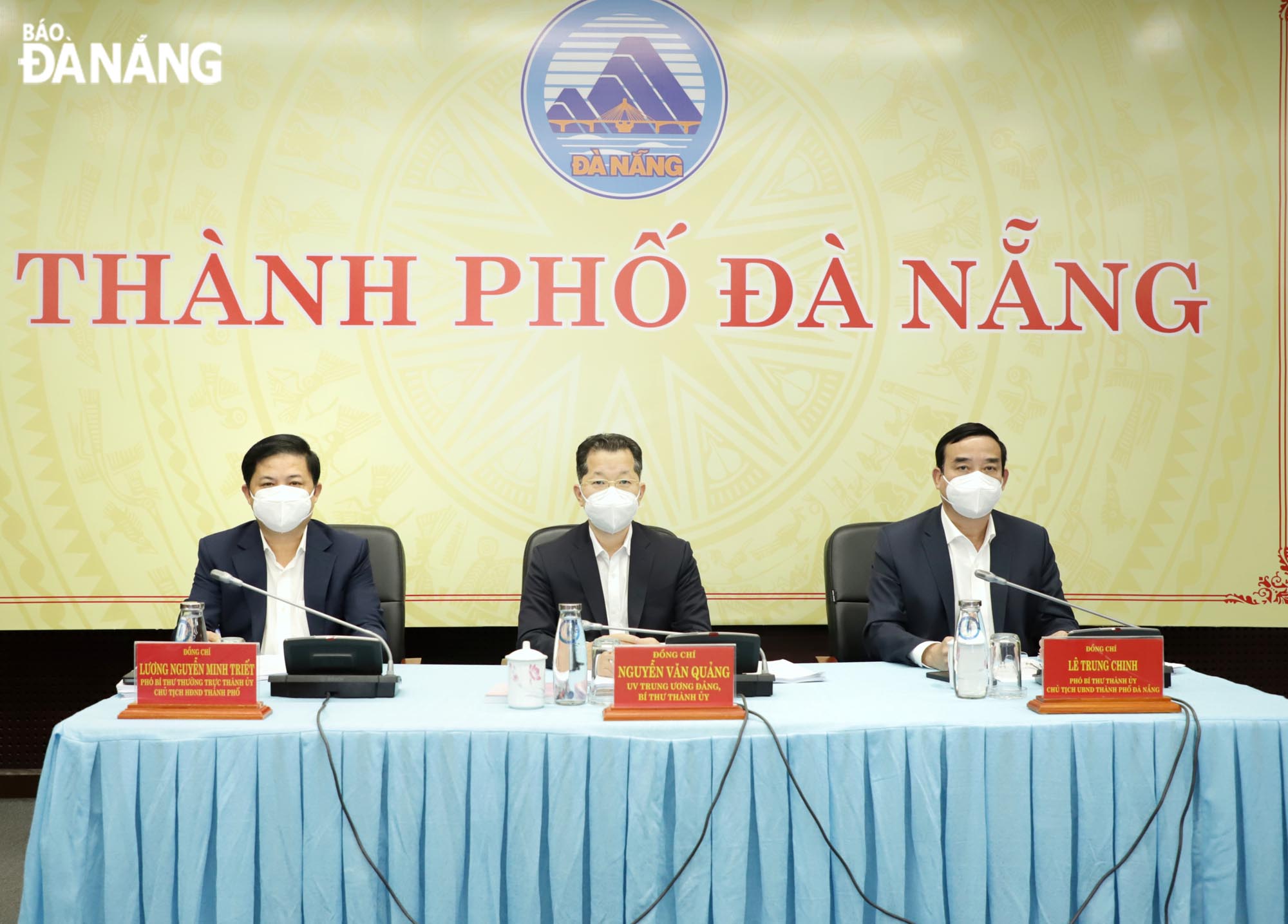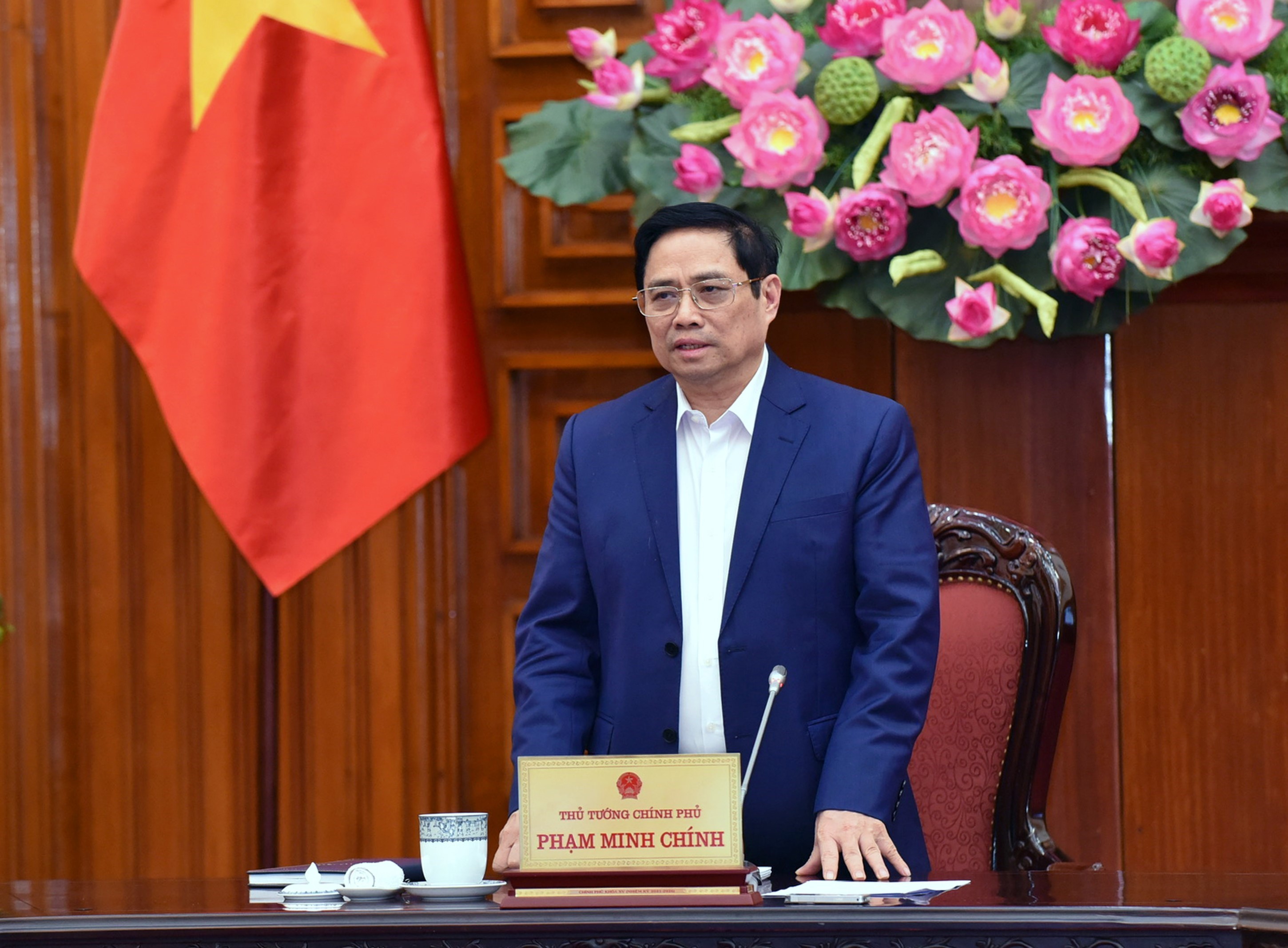PM suggests highly-effective measures for Da Nang development strides
Prime Minister (PM) Pham Minh Chinh made some constructive suggestions for Da Nang’s socio-economic development strides in the coming time, with a focus on strengthening public-private cooperation, developing high-quality human resources, infrastructure, and promoting tourism while chairing a virtual meeting between the national government's permanent members and the city’s key leaders on Wednesday.
 |
| Da Nang Party Committee Secretary Nguyen Van Quang (centre), municipal Party Committee Deputy Secretary Luong Nguyen Minh Triet (left) and People's Committee Chairman Le Trung Chinh join the meeting, December 1, 2021. Photo: NGOC PHU |
Da Nang makes proposals on six groups of important issues
According to a report made by Da Nang Party Committee Secretary Nguyen Van Quang at the working session, under the Resolution No. 43-NQ/TW dated January 24, 2019 adopted by the Politburo on building and developing Da Nang by 2030, with a vision towards 2045, in the 2021-2030 period, Da Nang’s average annual growth rate of GRDP will be over 12%. By 2030, per capita GRDP at current prices will have reached around $8,700. This is a rather high goal set in the current economic context of the region, the country and the city, especially in the face of the heavy impacts of COVID-19.
The working session saw the Da Nang government make proposals to the national government, the PM and ministries on the implementation of key groups of matters.
Da Nang stressed a need to release mechanisms and policies to concretise Resolution No. 43-NQ/TW adopted by the Politburo, thereby creating a foundation for the city’s long-term development.
It is suggested that the PM to direct relevant ministries to support the building of Da Nang into a regulated financial centre of regional stature and the construction of a non-tariff zone and a national innovation startup centre in the city as well.
Also, it is necessary to amend and supplement Decree No. 144/2016/ND-CP dated November 1, 2016 stipulating a number of specific mechanisms on investment, finance, budgetary and management decentralization for Da Nang and facilitate the city to receive loans from the World Bank under the Development Policy Operations (DPOs) scheme.
Notably, there were recommendations on implementing key infrastructure development projects in service for economic development in the region and Da Nang in particular.
Notable amongst them are the Da Nang International Airport adjustment planning project in the 2021 – 2030 period, with a vision towards 2050, the upgrading of passenger terminal T1, the development of the University of Da Nang into the national-level one, the expansion of the Tuy Loan - Hoa Khuong section of the National Highway 14B, the adjustments to the investment policy for developing casinos in Ba Na Hills tourist area, the building of a road connecting the Da Nang Hi-Tech Park with the western ring road and the conversion of the dormitory areas in the western part of the city and another in the Hoa Khanh industrial urban area into housing units dedicated to workers.
 |
| Prime Minister Pham Minh Chinh chairs the meeting with the Da Nang key leaders, December 1, 2021. Photo: VNA |
Restructure the economy, create new driving force for development
In his closing speech at the event, PM Chinh highly lauded Da Nang for its great efforts over the past time, especially innovations in COVID-19 prevention and control and the spirit of solidarity.
“Da Nang needs to further the spirit of self-reliance, stick to reality, respect reality, and take reality as a measurement to push key tasks. The city needs to build a really clean and democratic administrative system, all for the people.”, emphasised PM Chinh.
As for his constructive suggestions for the Da Nang development, the national government chief underlined a must-do for Da Nang to strengthen public-private partnerships, develop high-quality human resources, boost infrastructure construction, develop tourism and entertainment industry in parallel with cultural progress, enhance administrative reform and maintain political stability.
In particular, focus should be on promoting economic restructuring in a more harmonious and balanced manner.
In addition to services and tourism, it is necessary to develop other industries, with emphasis on the high-tech industry and innovations, in tandem with ensuring a harmonious balance amongst industries and help economy avoid any risks when the city faces unexpected complicated problems like the COVID-19 surge.
Reporting by NGOC PHU, HOANG NHUNG- Translating by A.THU